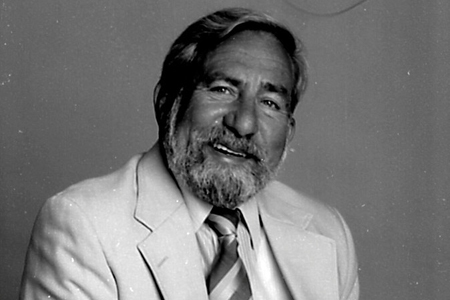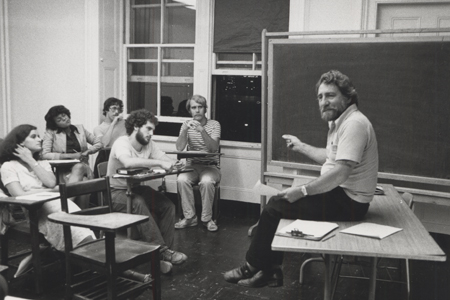Professor Emeritus Quenzel dies
George Quenzel, professor emeritus at Emerson College, died July 11, 2012, after a long illness. He was 84.
Quenzel taught in the Visual and Media Arts Department and its predecessors from 1958 to 1998. He was instrumental in the development of several classes and areas of concentration, helping modernize the television production program and teaching the first film production and film studies classes at Emerson.
@font-face {
font-family: “Cambria Math”;
}@font-face {
font-family: “Calibri”;
}p.MsoNormal, li.MsoNormal, div.MsoNormal { margin: 0in 0in 10pt; line-height: 115%; font-size: 12pt; font-family: “Times New Roman”; }.MsoChpDefault { font-size: 10pt; }div.WordSection1 { page: WordSection1; }
In 1981, he and Special Events Director Brooks Russell took 16 Emerson students to Los Angeles for The Hollywood Program, a month-long journey to the west coast that helped students experience what it was like to work in the entertainment industry. The students met with industry executives, and visited sets and tapings of shows such as The Jeffersons, Happy Days, CBS News, and The Merv Griffin Show. The program was a precursor to what is now known as Emerson College Los Angeles.

The Cape Cod Times reported that Quenzel’s son Mark recently commented to his father, “I drive by the new [Emerson] building in L.A. and think, you started that and I was with you on the first trip.”
Quenzel also founded the first New England chapter of the National Broadcasting Society, Alpha Epsilon Rho, at Emerson in the 1960s. He was the faculty advisor locally, and noted for his accomplishments and contributions on a national level. He helped Emerson host the organization’s regional conference in 1991, which was praised as a successful event by those in attendance.
Born in Jersey City, New Jersey, on July 28, 1927, to the late Quay and Irene Quenzel, he entered the Navy upon graduation from Xavier High School in Manhattan in June 1945. Quenzel served on the USS Iowa and was present for the signing of the peace treaty with Japan.
He attended Hofstra College, majoring in theater technology and acting, and went on to work for a stock company near Baltimore, where he was a junior apprentice with actor Vic Morrow. He later studied at the University of Iowa for his master’s and doctorate in theater and had a graduate teaching assistantship in television production.

Quenzel and his spouse, Donna Walcovy ’72, lived in Mashpee, Massachusetts, since 1996. He was an avid Red Sox fan, missing just two home games in the 1975 season, and travelled to four continents with Walcovy.
Besides his spouse, Quenzel is survived by three sons: Mark of Hartford, Connecticut, and Los Angeles; Erik of Stoughton, Massachusetts; and Keith of Boxford, Massachusetts. He also had four grandchildren and a Siamese cat.
To make a contribution to Emerson in honor of Quenzel, make checks payable to Emerson College and put a notation in the memo section that reads “George Quenzel Scholarship.”
Checks may be mailed to:
Emerson College
Development and Alumni Relations
120 Boylston Street, 7th floor
Boston, MA 02116-4624
For more information, contact Associate Vice President of Alumni Relations Barbara Rutberg at 617-824-8275.
Emerson Remembrances
Gary Grossman ’70, a TV producer, Emerson Trustee, and former student of Quenzel’s, said that his former professor’s death is “a significant loss for Emerson alumni and a cultural loss. George Quenzel, Q as we knew him, headed TV and film courses. He was an inspiration who led us to push for a strong film program.”
Linda Corradina ’81, president of Emerson’s New York alumni chapter and a retired television executive, said, “I took television production with Professor Quenzel in 1979. It was my first real production course and I was elated to be in his class. I learned all the basics of shooting and editing, as well as how to tell a good story. He was a kind and patient teacher and one I won’t forget.”
Emerson Media Technologies and Production Operation Manager Paul Beck, who knew Quenzel personally and professionally, said, “George provided a unique blend of professional artistry that was part of his formal training as an actor and performer, combined with his encyclopedic knowledge of cinema history, and perhaps most importantly, his great experiences as a live television director at the original WGBH-TV. George brought this battery of skills and expertise to each and every class that he taught. It mattered not if the student exercise was televising a faux game show, a simple three-person interview, or a nine-camera orchestral extravaganza; his message to his students and the academic focus he stressed was to embrace the event from an artistic and cinematic approach, as well as the practical aspect and the economies of doing live television in a frugal manner. George Quenzel left an indelible mark upon hundreds of television professionals, and imbued in us all a strong sense of engaging in the task to succeed. He taught us to do the task with excellence, perhaps with a little bit of elegance, and to treat the subjects and events being covered with respect and dignity. There is not much more that any television or film director could hope to aspire to. We will miss him.”
Quenzel’s former student Paul Guggenheimer ’81 remembered his professor’s humor. “I was doing a project for George over the course of a summer and when I asked what his office hours were so I could check in with him, all he said was, ‘I’ll be in on the next rainy day.’ That stills makes me laugh,” he said.
Nanci Isaacs ’79 said Quenzel was a “great man” and an “excellent educator.”
Another former student of “Q’s,” Alice Schmitt Dasher ’81, commented that the loss of Quenzel was a “sad moment indeed for all of us.”
Kiki Steele ’81 said, “It was always a pleasure being in George’s class. He was always a patient and kind teacher.”
Rick Royal ’82 remembered that he “enjoyed class with Professor Quenzel. He was a likable man and a thorough educator.”
Barry Rosenthal ’72 said that “George left an indelible mark on all of us.”
Categories